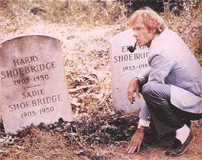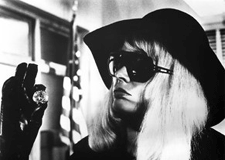|
Newest Reviews:
New Movies -
The Tunnel
V/H/S
The Tall Man
Mama Africa
Detention
Brake
Ted
Tomboy
Brownian Movement
Last Ride
[Rec]³: Genesis
Hara-Kiri: Death of a Samurai
Indie Game: The Movie
Abraham Lincoln: Vampire Hunter
Old Movies -
Touki Bouki: The Journey of the Hyena
Drums Along the Mohawk
The Chase
The Heiress
Show
People
The Strange Affair of Uncle Harry
Pitfall
Driftwood
Miracle Mile
The Great Flamarion
Dark Habits
Archives -
Recap: 2000,
2001, 2002,
2003, 2004
, 2005, 2006,
2007 , 2008
, 2009 ,
2010 , 2011 ,
2012
All reviews alphabetically
All reviews by star rating
All reviews by release year
Masterpieces
Screening Log
Links
FAQ
E-mail me
HOME
| |
Family
Plot (Alfred Hitchcock) 1976
 Family
Plot, Alfred
Hitchcock’s final film, ends with the lead character winking directly at the
camera, and that seems fitting closure to the career of one of the most
manipulative masters of moviemaking. Otherwise, this caper comedy is a bit
lightweight, but generally likable enough for us to ignore its flaws. The comedy
is odd, in a way, because much of the humor seems to come from the crudeness of
its characters. That they chew with their mouths open and have to worry about
money (going through what they do for a mere $10,000) seem endearing qualities
to Hitchcock, who revels in their flirtatious sex talk. There is also an
abundance of irony in this tale of a duo that creates a faux-psychic front so
that they can exercise their deft detective skills and a pair of kidnappers that
expend much energy avoiding a large inheritance. It becomes clear that if both
pairs dropped their pretenses, they would have a much simpler time finding an
end to their means (but then the film’s ending shows that had they not been so
quirky they would have gone off with less of a reward).
Family
Plot, Alfred
Hitchcock’s final film, ends with the lead character winking directly at the
camera, and that seems fitting closure to the career of one of the most
manipulative masters of moviemaking. Otherwise, this caper comedy is a bit
lightweight, but generally likable enough for us to ignore its flaws. The comedy
is odd, in a way, because much of the humor seems to come from the crudeness of
its characters. That they chew with their mouths open and have to worry about
money (going through what they do for a mere $10,000) seem endearing qualities
to Hitchcock, who revels in their flirtatious sex talk. There is also an
abundance of irony in this tale of a duo that creates a faux-psychic front so
that they can exercise their deft detective skills and a pair of kidnappers that
expend much energy avoiding a large inheritance. It becomes clear that if both
pairs dropped their pretenses, they would have a much simpler time finding an
end to their means (but then the film’s ending shows that had they not been so
quirky they would have gone off with less of a reward).
 Still, there are some real Hitchcockian thrills to be found
in this “comedy”. The kidnappers are dastardly and resourceful, and their
elaborate exploits are genuinely thrilling. Even more rousing though is when the
director plays his action scenes for laughs, like he does in a furious downhill
slalom that occurs after some brake lines are clipped. John Williams’ obvious
and overbearing score never really feels out of place since we’re so aware of
the game that’s being played with us. There’s less of a feel here than in
the average Hitchcock film that the sex and violence is repulsive yet
attractive, so we don’t feel dirty for enjoying ourselves at the expense of
some fictional characters. We’re not being dared to sympathize with thugs or
malcontents here, since the initially lawless protagonists move closer toward
justice as the film goes on. The tone becomes more likable as the picture
progresses, and this conversion might be the main reason for that. The
escalating level of danger or the lack of clumsy exposition in the second hour
might also be to blame. In any case, the charms of the movie are eventually
undeniable. Approached as a standard Hitchcockian thriller, it might come up a
bit short, but once you tap into the film’s gentle satire of its characters
and genre, the strengths of Family Plot become apparent.
Still, there are some real Hitchcockian thrills to be found
in this “comedy”. The kidnappers are dastardly and resourceful, and their
elaborate exploits are genuinely thrilling. Even more rousing though is when the
director plays his action scenes for laughs, like he does in a furious downhill
slalom that occurs after some brake lines are clipped. John Williams’ obvious
and overbearing score never really feels out of place since we’re so aware of
the game that’s being played with us. There’s less of a feel here than in
the average Hitchcock film that the sex and violence is repulsive yet
attractive, so we don’t feel dirty for enjoying ourselves at the expense of
some fictional characters. We’re not being dared to sympathize with thugs or
malcontents here, since the initially lawless protagonists move closer toward
justice as the film goes on. The tone becomes more likable as the picture
progresses, and this conversion might be the main reason for that. The
escalating level of danger or the lack of clumsy exposition in the second hour
might also be to blame. In any case, the charms of the movie are eventually
undeniable. Approached as a standard Hitchcockian thriller, it might come up a
bit short, but once you tap into the film’s gentle satire of its characters
and genre, the strengths of Family Plot become apparent.
*
* * 1/2
02-04-02
Jeremy
Heilman
|